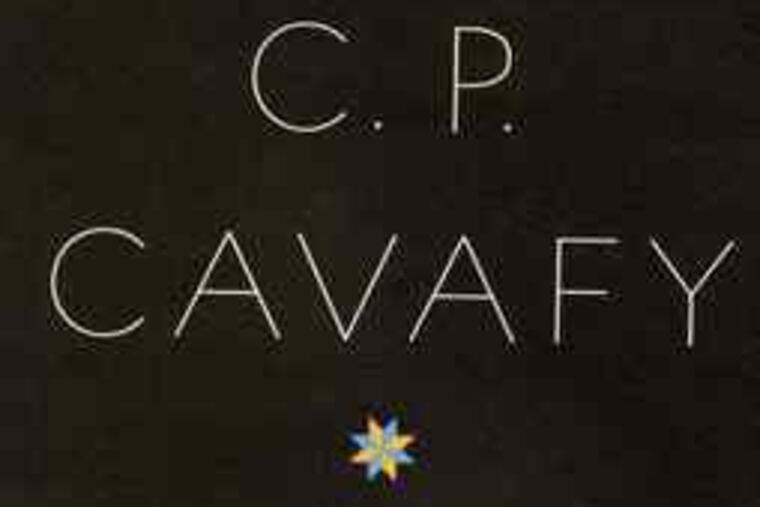Poems from a Greek master
These books mark an important moment in publishing. Collected Poems presents, in careful, professional translations, virtually all the known poetry of Constantine P. Cavafy (1863-1933), one of the 20th century's best-known poets. The translator, Daniel Mendelsohn, an accomplished critic and classicist, is alive to the nuances of Greek. Best of all, he furnishes us with full, excellent notes to the life of Cavafy and to the poems.

Translated with notes
by Daniel Mendelsohn.
Knopf. 524 pp. $35. nolead ends
nolead begins C.P. Cavafy: The Unfinished Poems
nolead ends nolead begins Translated with notes
by Daniel Mendelsohn.
Knopf. 144 pp. $30.
nolead ends nolead begins
Reviewed by John Timpane
These books mark an important moment in publishing.
Collected Poems
presents, in careful, professional translations, virtually all the known poetry of Constantine P. Cavafy (1863-1933), one of the 20th century's best-known poets. The translator, Daniel Mendelsohn, an accomplished critic and classicist, is alive to the nuances of Greek. Best of all, he furnishes us with full, excellent notes to the life of Cavafy and to the poems.
The Unfinished Poems adds to this by presenting, for the first time, translations of 30 Cavafy poems left in various states of imperfection - although many of them seem pretty fine, I must say. Mendelsohn does the same solid job with these, and his notes are as helpful and loving.
Why the excitement? First of all, there's Cavafy's reputation, never higher than now, and likely to rise even higher, especially since the unfinished poems seem so good.
Then there is Cavafy's life. He, to be both compassionate and fair, was odd. A Greek-speaking resident of Alexandria, Egypt, he lived in England from ages 9 to 16. The collapse of the family business led back to Alexandria. Seldom in Greece itself, he had, by 1885, settled permanently in Alexandria, working first as a journalist and then as a civil servant for Egypt's Ministry of Public Works.
A Greek who did not live in Greece, he lived a quiet life with his mother, Herakleia, until her death in 1899, then with unmarried brothers, then alone in his own apartment. An agonized Christian, a voracious reader of ancient history, and a closeted homosexual, he distributed poems and pamphlets privately, but never published a book. His poetry didn't fit the verse of the time, and he gained very limited notice until the 1920s.
So he fell, and still falls, athwart categories. His muted, direct poetry tends to work not through metaphor or simile, but through characters and situations. His effects in Greek are so subtle that translations usually miss them and fall into prose.
Of his two favorite realms, one is Greek/Byzantine history - especially moments narrated by little-known greats, peripheral kings, philosophers, generals, and onlookers. As Mendelsohn so beautifully puts it, the ancient world Cavafy evokes is "rich yet exhausted, glorious yet doomed, proudly attempting to uphold great traditions even as it disintegrates."
Here you'll find a parade of lessers - Alexander Balas, Antiochus Epiphanes, John Cantacuzenus, Anna Dalassene, once-greats now buried by history. They speak of their hopes, disappointments, achievements; few realize they will be swamped in time. These poems teach us much about history, politics, and the foolishness of ever thinking you've got it made.
Cavafy's other realm is sexuality and sensuality. He may have had his first gay encounter when he was 20; for much of his adult life, he'd have a long dinner with Mom at home and then leave her, to visit the tough side of town shopping for tenderness. Although he was extremely discreet about his own life, his poetry becomes more open, especially after her death. After 1911, his attitude and poetry seem to embrace the life he struggled with for so long.
Cavafy's triumph is that his love poems can evoke the same enduring, compelling themes as his history poems: loneliness and loss, the nature of nobility, the ravages of time, the power of pleasure, and the fleeting nature of happiness. The unfinished, exquisite poem "The Photograph" begins with a speaker looking at a former lover's "beautiful youthful face":
(lost forever more; - the photograph
was dated 'Ninety-two),
the sadness of what passes came upon him.
And yet he is glad the two of them "didn't let any foolish shame/get in the way of their love, or make it ugly."
In "The 25th Year of His Life," a speaker who met and fell in love with a man at a tavern a month before
goes to the tavern frequently at night,
And sits and looks toward the entrance. . . .
Perhaps he'll come in. Tonight, perhaps he'll come.
Several of the unfinished poems, such as "The Item in the Paper," "On the Jetty," or "After the Swim," will strengthen Cavafy's already high repute, and join his best-known poems, which include "Waiting for the Barbarians," "Ithaca," "The God Abandons Antony" (in a translation here I like very much), and "The City." His verse, often sad, forbids pity, for in this life, we feel again and again, he encountered and rejoiced in the beautiful.
I used the words careful and professional for Mendelsohn's translations. He really does know his modern Greek, and he tries in many subtle ways to echo the musical effects for which Cavafy is prized by readers of Greek. These translations don't sing, because Cavafy usually doesn't. On the other hand, I can't pretend they're not sometimes flat, which Cavafy seldom is. In several instances, I go back to translations that work better.
Mendelsohn, however, is by far the best, most informative critic ever to talk about this poetry and its many virtues. For this, and for the incredible feat of bringing it all together and guiding readers through, he deserves our applause. This book is an even bigger triumph for its editing and commentary than for the translations themselves.